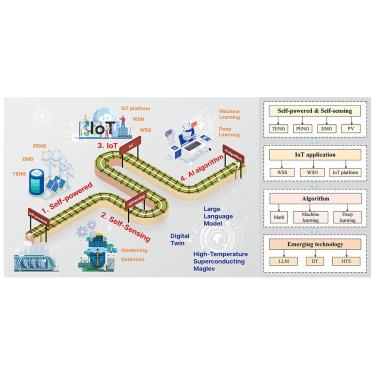Sustainable and smart rail transit based on advanced self-powered sensing technology
IF 4.6
2区 综合性期刊
Q1 MULTIDISCIPLINARY SCIENCES
引用次数: 0
Abstract
As rail transit continues to develop, expanding railway networks increase the demand for sustainable energy supply and intelligent infrastructure management. In recent years, advanced rail self-powered technology has rapidly progressed toward artificial intelligence and the internet of things (AIoT). This review primarily discusses the self-powered and self-sensing systems in rail transit, analyzing their current characteristics and innovative potentials in different scenarios. Based on this analysis, we further explore an IoT framework supported by sustainable self-powered sensing systems including device nodes, network communication, and platform deployment. Additionally, technologies about cloud computing and edge computing deployed in railway IoT enable more effective utilization. The deployed intelligent algorithms such as machine learning (ML) and deep learning (DL) can provide comprehensive monitoring, management, and maintenance in railway environments. Furthermore, this study explores research in other cross-disciplinary fields to investigate the potential of emerging technologies and analyze the trends for future development in rail transit.

基于先进自供电传感技术的可持续智能轨道交通
随着轨道交通的不断发展,不断扩大的铁路网络增加了对可持续能源供应和智能基础设施管理的需求。近年来,先进的轨道自供电技术向人工智能和物联网(AIoT)方向快速发展。本综述主要讨论轨道交通中的自供电和自感应系统,分析其在不同场景下的现有特点和创新潜力。在此分析基础上,我们进一步探讨了可持续自供电传感系统支持的物联网框架,包括设备节点、网络通信和平台部署。此外,在铁路物联网中部署的云计算和边缘计算技术也能提高利用效率。部署的智能算法,如机器学习(ML)和深度学习(DL),可为铁路环境提供全面的监控、管理和维护。此外,本研究还探讨了其他交叉学科领域的研究,以研究新兴技术的潜力,分析轨道交通未来发展的趋势。
本文章由计算机程序翻译,如有差异,请以英文原文为准。
求助全文
约1分钟内获得全文
求助全文
来源期刊

iScience
Multidisciplinary-Multidisciplinary
CiteScore
7.20
自引率
1.70%
发文量
1972
审稿时长
6 weeks
期刊介绍:
Science has many big remaining questions. To address them, we will need to work collaboratively and across disciplines. The goal of iScience is to help fuel that type of interdisciplinary thinking. iScience is a new open-access journal from Cell Press that provides a platform for original research in the life, physical, and earth sciences. The primary criterion for publication in iScience is a significant contribution to a relevant field combined with robust results and underlying methodology. The advances appearing in iScience include both fundamental and applied investigations across this interdisciplinary range of topic areas. To support transparency in scientific investigation, we are happy to consider replication studies and papers that describe negative results.
We know you want your work to be published quickly and to be widely visible within your community and beyond. With the strong international reputation of Cell Press behind it, publication in iScience will help your work garner the attention and recognition it merits. Like all Cell Press journals, iScience prioritizes rapid publication. Our editorial team pays special attention to high-quality author service and to efficient, clear-cut decisions based on the information available within the manuscript. iScience taps into the expertise across Cell Press journals and selected partners to inform our editorial decisions and help publish your science in a timely and seamless way.
 求助内容:
求助内容: 应助结果提醒方式:
应助结果提醒方式:


